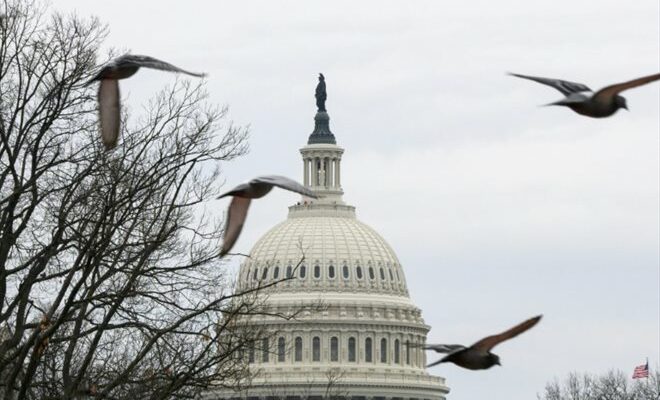The Capitol in Washington, February 27, 2024 (AFP/Mandel NGAN)
The elected representatives of the American House of Representatives adopted part of the 2024 budget of the United States on Wednesday, which should make it possible to avoid an imminent partial paralysis of the federal state, on the eve of the speech on the state of the Union of Joe Biden.
This $467.5 billion spending program was adopted by 339 votes to 85, and the Senate now has until Friday at midnight to vote in turn, and thus avoid paralysis.
Several ministries, including Agriculture, Justice, Interior and Environment, Commerce and Transport, would then see their budgets secured until the end of the fiscal year, September 30, 2024.
the leader of the Democratic minority in the House, Hakeem Jeffries, recalled in a press release that his party has “clearly indicated” that it will seek “as much as possible common ground with (his) Republican colleagues and (will fight) Republican extremism whenever necessary.
The House of Representatives, in fact, has become the terrain of a fierce political battle.
Elected officials from the most right-wing fringe of Republicans, close to Donald Trump, had so far succeeded in blocking the adoption of any budget for this year, forcing the world’s largest economy to operate in the short term, or even very short term. .
Thus, this vote comes more than five months late, since the fiscal year began on October 1.
And it comes on the eve of US President Joe Biden’s State of the Union speech, the traditional major general policy address by presidents to the US Congress.
It will be of particular importance in this election year, two days after “Super Tuesday”, primaries of the two parties in many states.
Because after the overwhelming victories of Joe Biden on the Democratic side, and Donald Trump on the Republican side, the two men should, barring any major surprises, face each other in the November presidential election.
– “Internal security” –
Despite this vote, the threat of a “shutdown” has not been lifted in the short term, because this text covers less than a third of all expenditure, and the other part of the budget expires. on March 22, and includes sensitive topics, such as border security.
“The next tranche is more difficult than the first tranche,” Republican elected official Steve Womack told journalists on Tuesday, adding that “there is an important issue”, because “internal security is part of this next tranche” .
Paralysis – the famous “shutdown” – has so far been avoided this year, but each time at the last minute.
Because, to compensate for an agreement on an annual budget, Congress had to operate through a series of mini-laws to extend the budget by a few days, weeks or months.
As soon as one of these mini-budgets is about to expire, as was to be the case for one of them on Friday, the risk arises that the federal administration will be partially shut down, what the Americans call “shutdown”.
The list of potential consequences is long: unpaid air traffic controllers, shut down administrations, frozen food aid, unmaintained national parks…
The part of the budget adopted on Wednesday had itself been postponed only a week ago, to avoid the partial paralysis that loomed due to lack of agreement before March 1 at midnight. This was the fourth time since October that the deadline had been postponed.
These deep disagreements illustrate the dysfunctions within the American institutional apparatus.
© 2024 AFP
Did you like this article ? Share it with your friends using the buttons below.




